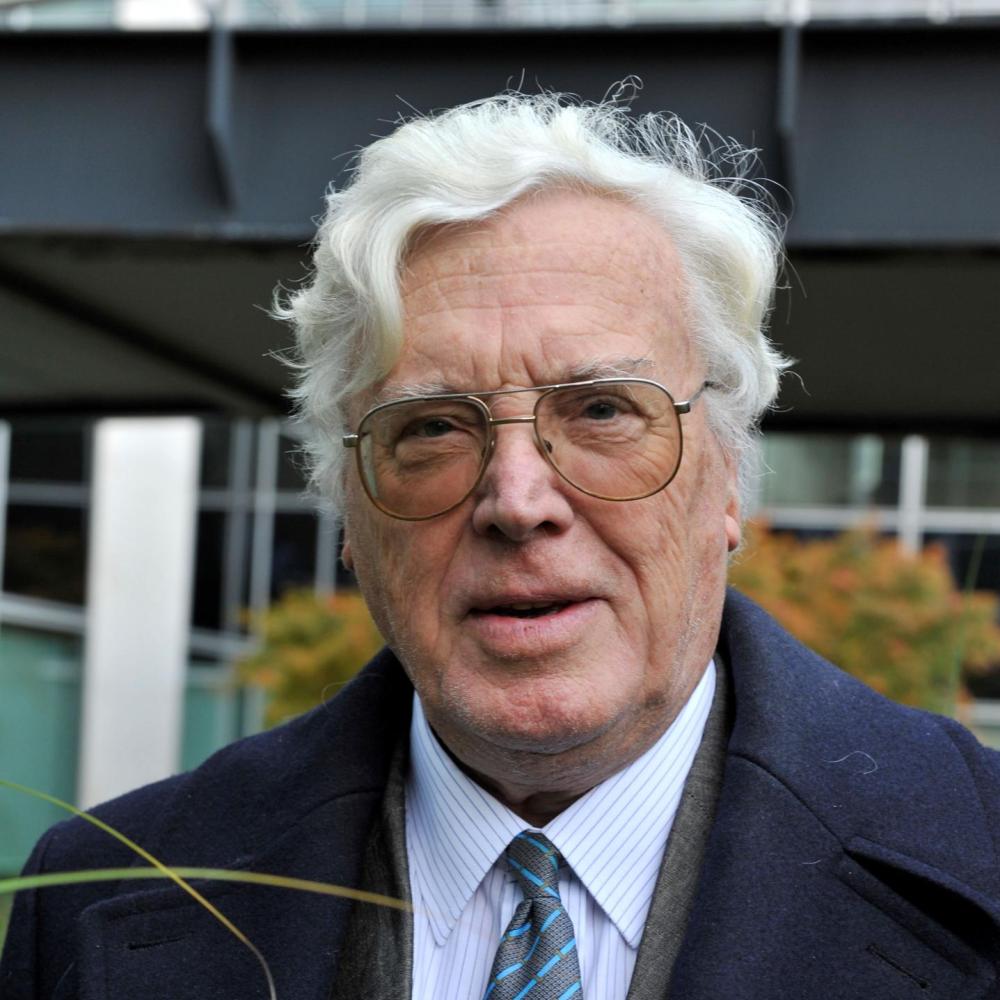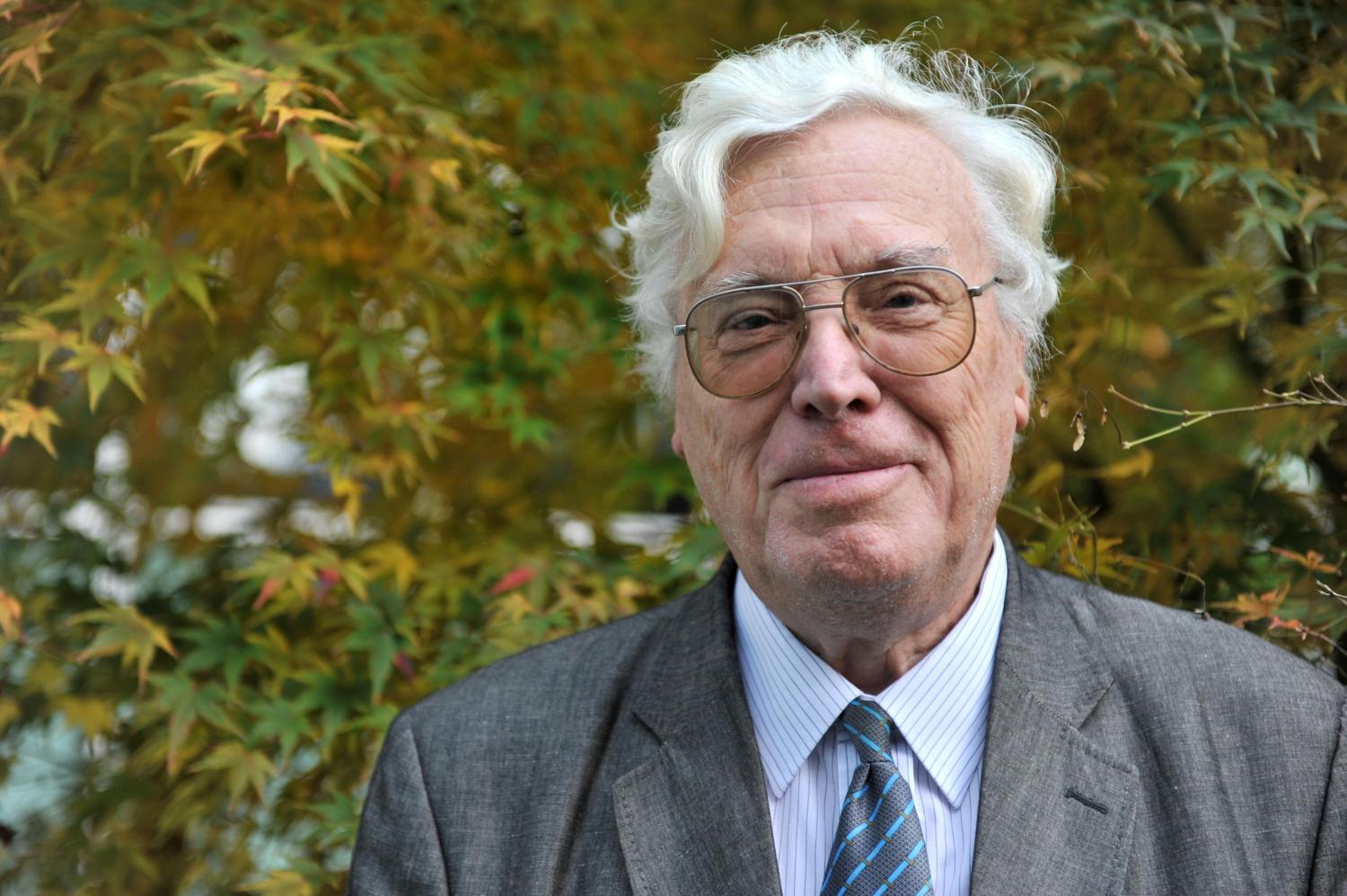
Bio/CV
Bart De Schutter succeeded Roger Van Geen in 1978 as the third rector of the VUB. He professionalised the academic management of the university by dividing it into strategy and operational matters. He focused primarily on strategy, especially education and research. During his tenure, education was modernised, and his social engagement made him a strong advocate for democratic higher education.

Rectorship
De Schutter was an active networker for the internationalisation of the VUB, first as dean of the Faculty of Law and later as rector. The first formal international cooperation agreements were signed under his leadership. With the support of VLIR, the VUB offered development aid and established agreements with universities in the Global South. This policy laid the foundation for what is now known as the University Centre for Development Cooperation (UCOS).
As rector, De Schutter saw himself more as an ambassador than an administrator. He established many contacts in the research council as well as in numerous international organisations. He made public relations a key focus, leading to the first publication of a central Mededelingenblad, or announcement bulletin. Simultaneously, he delegated much of the operational responsibilities of the university to his team to manage independently and efficiently.
De Schutter was a true new public manager, recognising that a slogan like “managers must manage” also imposed limitations on him as rector. This self-imposed separation of strategy and operational decisions was particularly notable within the academic governance culture of the early 1980s. He aimed to assume responsibility mainly at the academic level. Education policy and research policy received his full attention, while business decisions regarding personnel and finances were prepared by his associate, the future rector Oscar Steenhaut. This professionalisation based on the division of labour in academic management was a significant innovation.
It’s no surprise that, as chair of the Brussels Student Society and the Alumni Association of the VUB, he was also deeply concerned with the university as a community, united around its secular values. His amiability and human engagement were not only personal traits, as many colleagues frequently noted, but also a consistent theme in his policies. His social commitment made him a staunch advocate of democratic higher education.
This came to a head when the Belgian government’s austerity measures began to affect universities. De Schutter, like his colleagues in Ghent and Leuven, faced student protests against the increase in tuition fees. However, he handled it in his own unique way, warmly welcoming the students who came to occupy the rectorate.
In general terms, De Schutter’s rectorship was a period of strengthening both quality and solidarity. The young VUB had to offer research-driven education of the highest calibre, which also needed to be engaging and innovative. He was a strong proponent of supporting information technology and computers in research and education and invested in modern pedagogical tools. Under his rectorship, the education council became a truly central policy body, having previously served mainly as an approval body that registered decisions made at the faculty level. The educational programme of each faculty had to be logically and coherently structured, and the rector believed that this needed to be directed from the top down. With this helicopter view, he also ensured a better balance between departments within the faculties.
For De Schutter, solidarity was a necessity, as he believed the VUB should also be a fully comprehensive university. To maintain this broad offering, he required stronger faculties and programmes to financially support less privileged departments. This ensured that all programmes, even those with a small number of students, were adequately staffed and had access to the necessary resources. Only in this way could high-quality education across the entire range of VUB programmes remain competitive. The societal pluralism that he, as an engaged secularist, held in high regard was thus guaranteed.
“No to the 10,000” protest
Bart De Schutter refused to have the occupied rectorate building cleared by the state police during students’ “No to the 10,000” protest against a doubling of tuition fees in 1978. He was more of a host than an opponent to the students. One student even testified how “the rector” personally came with a driver to collect him from the police station.
Studies and career
Bart De Schutter (Grimbergen, 21 August 1937) studied at the Royal Atheneum of Boom, the town where his grandfather had once been the socialist mayor. He then studied law and political and diplomatic sciences at the unitary ULB/VUB. After a spell at Harvard University, he remained connected to the VUB throughout his entire career as a student, assistant, professor, dean, rector and prorector. While he also taught at the Antwerp Faculty of Law and HIVT, his CV was synonymous with a life dedicated to the VUB.
De Schutter graduated from the ULB with a doctorate in law in 1959 and a year later with a degree in political and diplomatic sciences. With a Fulbright Fellowship and a Smith-Mundt scholarship, he obtained his master of international law from Harvard University in 1961. In 1962, he was appointed at the ULB as a part-time “assistant C” for the Dutch-language course in criminal law and criminal procedure. But his interest in international law had been sparked and would become the core of his academic work. For this, he received a doctoral scholarship from the National Fund for Scientific Research in 1963. He also attended lectures at the International Faculty of Law in Strasbourg and the International Law Commission in Geneva during that time.
Eventually, De Schutter became the first full-time Dutch-speaking “assistant A” in law in 1965, working with four professors: H Bekaert, F De Pauw, E Van Bogaert and J Van Tichelen. His role covered the “entirety of their teaching”, ranging from criminal law and criminal procedure to public law, as well as his own research field of international law.
He received a Fellowship from Harvard Law School that year. Through his guest lectures, he continued to build the international network of the young VUB, something that was constant throughout his later rectorship. After Harvard and New York University Law School, he taught as a professor at the University of Montreal for two years. Upon his return, his assignment was expanded to include a part-time lectureship for courses such as International Dispute Resolution, Issues in Constitutional Law and Principles of International Criminal Law. In 1969, he became a full-time lecturer and also taught the course Advanced Study of the Institutional Law of the European Communities. These lectures were part of the then-specialised licence in international law, where he served as the driving force and secretary. From 1971 to 1973, he followed in the footsteps of Professors De Pauw and Van Bogaert in the field of international law and was appointed as an extraordinary professor at the start of the 1971-1972 academic year.
During this time, he was appointed vice-dean in charge of reforming the faculty’s educational offerings, with significant investments made in evening education. From 1975, the “special guidance programme” provided dozens of working students with opportunities for legal training and social advancement each year. Besides democratisation, building expertise was also a strategic objective. Thus, in January 1971, the Programme on International Legal Cooperation (PILC) was launched, a specialised course aimed at foreign students and taught in English. That same year, De Schutter was appointed as its head; by his retirement, the PILC had awarded more than 1,000 diplomas to students from dozens of countries. Two years later, he was appointed full professor at the faculty. He led the research centre for International Criminal Law as its first director. He then served as its dean from 1974 to 1978. His innovative and active approach to the Faculty of Law formed the basis for his election as rector in 1978.
After his four-year term, his governance experience was utilised as a member of the Belgian Privacy Commission, as a member of the board of directors of the Institute of Tropical Medicine from 1987, and from 1994 as chair of the BRTN. Within his faculty, he became chair of the department of Legal Development/Comparative Law and European Law.
All these functions and academic responsibilities were closely related to his areas of interest: European law and the legal implications of information technology. In 1990, he introduced a course addressing security issues and challenges for privacy protection: Capita Selecta: Security. In all these specialised courses, and in legal methodology, he showed himself to be an inspiring and pragmatic mentor. In his innovative teaching method, he allowed space for seminar work with discussions and case method approaches, with ex-cathedra lectures being the exception. Towards the end of his career, he further explored the study of the European Union as director of the Centre for European Studies.
Awards and Laureates
- Aspirant N-FWO (1963)
- Member of the Belgian Delegation for the Revision of the Geneva Convention (1974)
- Founder and director of the Center for International Criminal Law, the Programme on International Legal Cooperation (1971) and the Institute for European Studies (2002)
- Co-founder of the Union of Secular Associations, now deMens.nu (1971)
- Chair of the Vrij Onderzoek study circle (1956), BSG (1957-1959) and OSB-VUB (1969-1972).
CV
- 1957-1959 Chair of the Brussels Student Society
- 1959 Doctor of Law 1960 Licentiate in Political and Diplomatic Sciences
- 1961 Master of International Law (Harvard University)
- 1962 Assistant at the ULB
- 1965 Full-time assistant to Professors H Bekaert, F De Pauw, E Van Bogaert and J Van Tichelen
- 1968 Lecturer at ULB, later VUB
- 1969-1972 Chair of the Alumni Association and co-founder of the Union of Secular Associations
- 1971-2003 Director of the Programme on International Legal Cooperation (PILC), now part of the IES
- 1973 Full professorship at VUB
- 1974-1978 Dean of the Faculty of Law VUB
- 1978-1982 Rector VUB
- 1983-1986 Chair of the VUB Research Council
- 1992-2013: Board member of the Privacy Commission
- 1994-2000 Chair of the board of directors BRTN/VRT
- 2001-2015 Chair of the Institute for European Studies (IES)
- 2002 Professor Emeritus (Supervisor of, among others, Chris Van den Wijngaert (1979), Jan Gorus (1984), Serge Gutwirth (1992), Marc Cools (1993) and Paul De Hert (2000))
- 2005-2022 Chair of Erasmushogeschool
- 2010-2013 Chair of the University Association Brussels